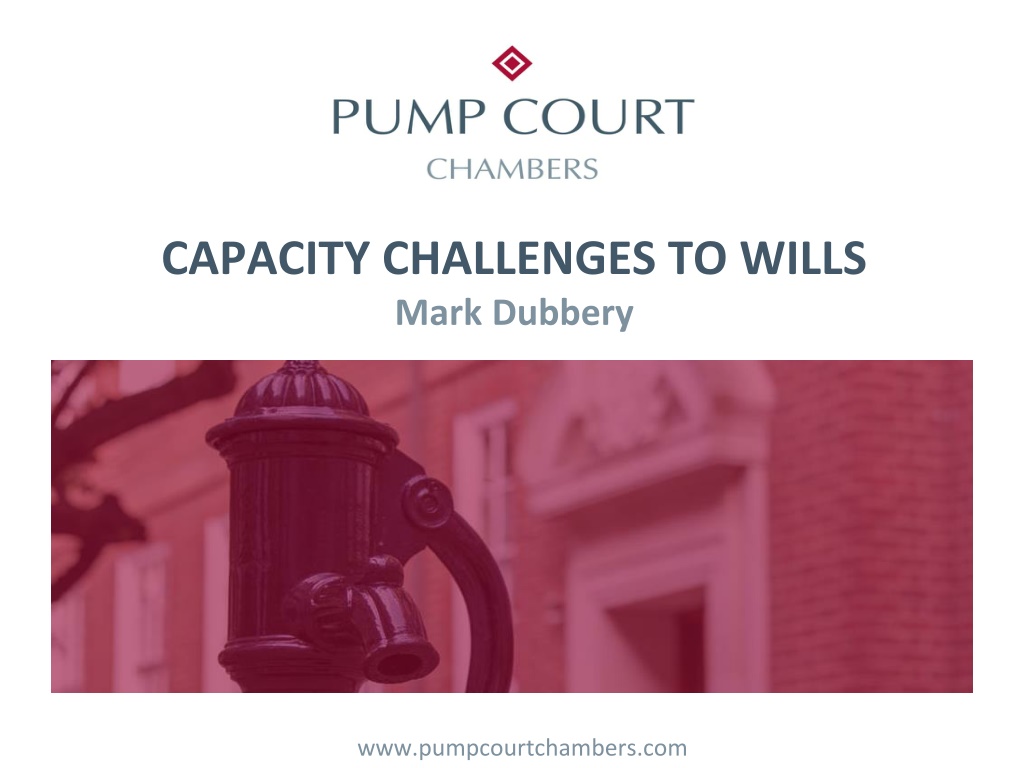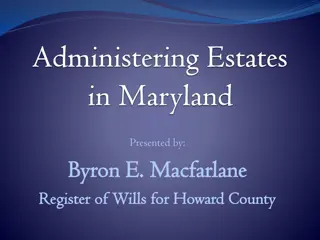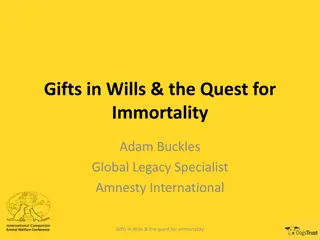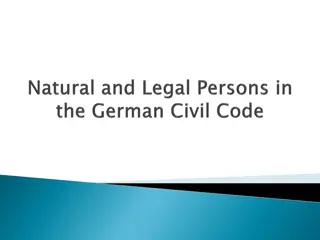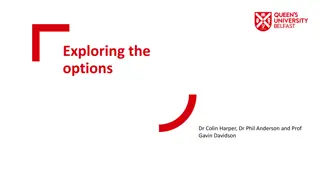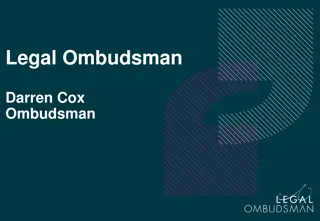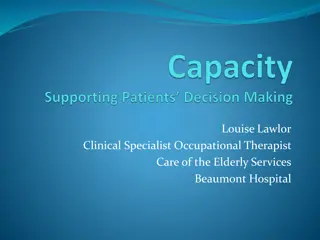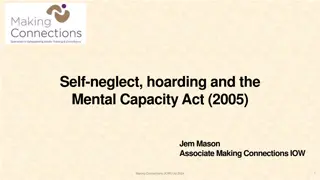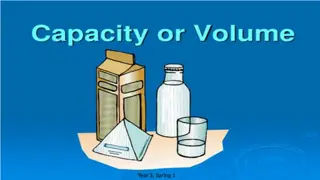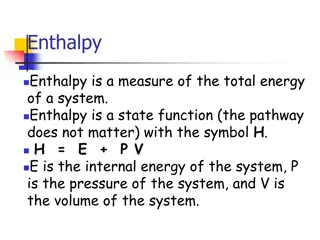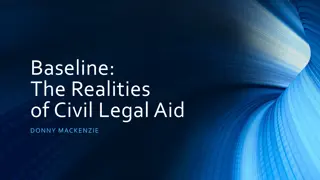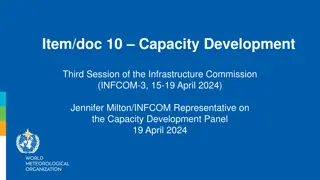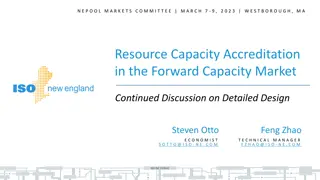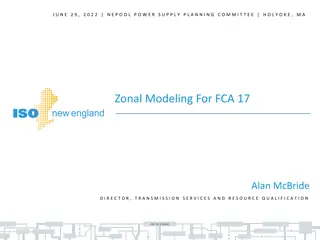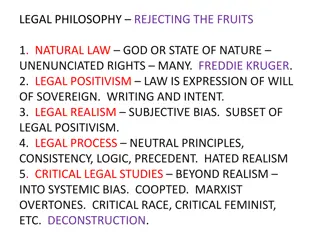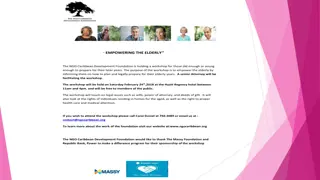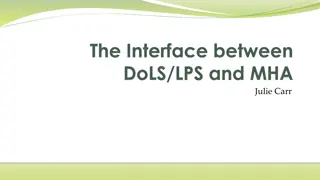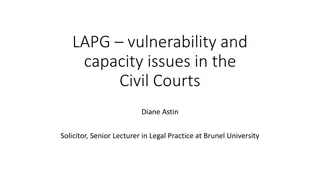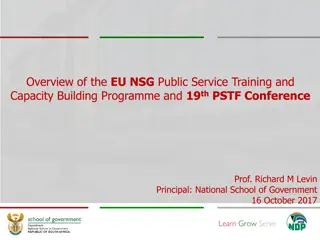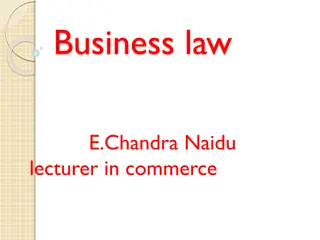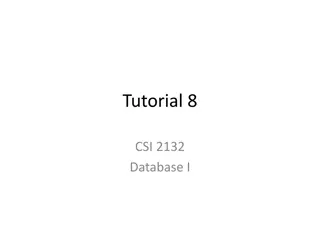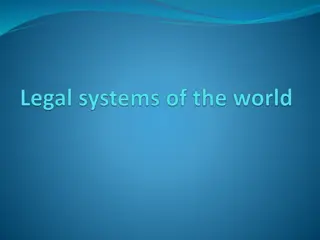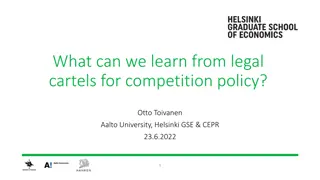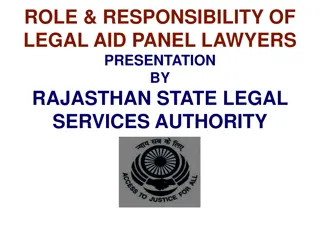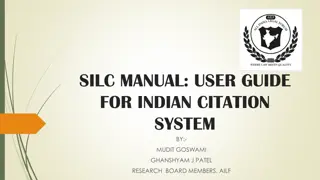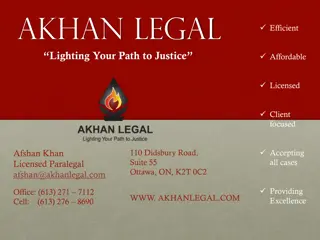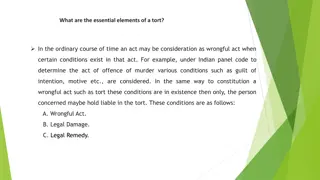Understanding Capacity Challenges in Wills: Legal Insights
Testators must possess mental capacity when making a will, as established in legal cases like Banks v. Goodfellow. The common law test for testamentary capacity remains relevant despite the Mental Capacity Act 2005. The Banks v. Goodfellow test outlines the required mental power for making a valid will, emphasizing understanding property disposal and avoiding influences of mental disorders. Lord Cockburn's insights further clarify the standards for testamentary capacity.
Download Presentation

Please find below an Image/Link to download the presentation.
The content on the website is provided AS IS for your information and personal use only. It may not be sold, licensed, or shared on other websites without obtaining consent from the author. Download presentation by click this link. If you encounter any issues during the download, it is possible that the publisher has removed the file from their server.
E N D
Presentation Transcript
CAPACITY CHALLENGES TO WILLS Mark Dubbery www.pumpcourtchambers.com
Introduction Testators must have sufficient mental capacity to make a decision as to how and to whom to dispose of their property on their death. It is possible that a testator suffering from dementia to make a vlaid will, provided that the dementia is mild The test for capacity to make a Will was laid down in Banks v Goodfellow [1870] LR 5 QB 549
The correct test for testamentary capacity Many assumed that the common law test for testamentary capacity had been replaced by the statutory test for capacity under the Mental Capacity Act 2005, and some thought the common law test had been supplemented by the statutory test. However, the test remains the common law test - Walker v Badmin [2014] EWHC 71 (Ch), Kicks v Leigh [2014] EWHC 3926 (Ch) (in relation to lifetime gifts); Elliott v Simmonds [2016] EWHC 732 (Ch); [2016] W.T.L.R. 1355; James v James [2018] EWHC 43 (Ch); [2017] W.T.L.R. 1313 at [87]; Costa v Germain [2019] EWHC 3324 (Ch). The Mental Capacity Act 2005 puts the burden squarely on the person alleging mental incapacity. It is not subject to the presumptions and counter- presumptions which are sometimes said to inform the common law test.
The Banks v Goodfellow test The legal principles as to testamentary capacity derive from Banks -v- Goodfellow [1870] LR 5 QB 549, in whichCocburn CJ said at 565 that: It is essential to the exercise of such a power that a testator shall understand the nature of the act and its effects; shall understand the extent of the property of which he is disposing; shall be able to comprehend and appreciate the claims to which he ought to give effect; and, with a view to the latter object, that no disorder of the mind shall poison his affections, pervert his sense of right, or prevent the exercise of his natural faculties - that no insane delusion shall influence his will in disposing of his property and bring about a disposal of it which, if the mind had been sound, would not have been made.
Lord Cockburn continued: Here, then, we have the measure of the degree of mental power which should be insisted on. If the human instincts and affections, or the moral sense, become perverted by mental disease; if insane suspicion, or aversion, take the place of natural affection; if reason and judgment are lost, and the mind becomes a prey to insane delusions calculated to interfere with and disturb its function, and to lead to a testamentary disposition, due only to their baneful influence in such a case it is obvious that the condition of the testamentary power fails, and that a will made under such circumstances ought not to stand. A delusion deprives the testator of testamentary capacity if it influences or is capable of influencing, the provisions of his will. In Re Belliss [1929] 141 LT 245 delusion that T had already benefitted one daughter more than the other.
Test is of ability to understand not of actual understanding The test is about the ability to understand these matters, rather than actual understanding. Simon v Byford [2014] EWCA Civ 280 capacity depends on the potential to understand. It is not to be equated with a test of memory . To have testamentary capacity, the testator must be able to understand the following matters: 1. The effect of his wishes being carried out at his death; 2.The extent of the property of which is disposing. The testator need not know the precise value. 3. The nature of the claims on him. The testator must recall the persons who may be fitting objects of the testators boundary and understanding to comprehend the their relationship to him and they claim to upon him so that he can decide whether or not to give each of them any part of his property.
The capacity required is relative Since the test for capacity requires an ability to understand the testator s own estate, and the potential beneficiaries which that particular testator might consider, the degree of mental capacity required will vary depending on the complexity of the testator s financial affairs and family position. It is not necessary that the testator know the precise value of his estate or even to identify all its components, just that he be able to appreciate its approximate value and the relative worth of the assets it comprises. In Simon v Byford, Lewison LJ said that it was not a requirement that the testator understands the significance of his assets to other people. A testator must be able to appreciate the claims of those whom he may wish to benefit under his will.
Time for satisfying the test: the rule in Parker v Felgate The ordinary rule is that testator must have testamentary capacity at the time when he executes the will. The exception is the rule in Parker v Felgate [1883] 8 PD 171. A testator who lacks testamentary capacity at the time of execution may make a valid will if: i. the testator has testamentary capacity at the time when he gives instructions to a solicitor for the preparation of the will; ii. the will is prepared so as to give effect to the instructions; iii. the will continues to reflect the testator s intentions; and iv. at the time of execution the testator is capable of understanding, and does understand, that he is executing a will for which he has given instructions.
Proving capacity InRe Key, decd [2010] 1 WLR 2020, Briggs J held that: 97 The burden of proof in relation to testamentary capacity is subject to the following rules. (i) While the burden starts with the propounder of a will to establish capacity, where the will is duly executed and appears rational on its face, then the court will presume capacity. (ii) In such a case the evidential burden then shifts to the objector to raise a real doubt about capacity. (iii) If a real doubt is raised, the evidential burden shifts back to the propounder to establish capacity none the less: see generally Ledger v Wootton [2008] WTLR 235, para 5, per Judge Norris QC.
Presumptions of capacity Although those propounding the will must satisfy the court that the testator was of sound disposing mind, if the will is rational on the face of it and is shown to be duly executed and no other evidence is offered, the court will pronounce for it, presuming that the testator was mentally competent e.g. Re Japal (decd) [2017] EWHC 2137 (Ch). Slight evidence of mental incapacity will not disturb this presumption - Sutton v Sadler (1857) 3 C.B. (N.S.) 87; White v Phillips [2017] EWHC 386 (Ch); [2017] W.T.L.R. 1559. Where real suspicion of incapacity arises, those propounding the will must dispel that suspicion by proving testamentary capacity - ; Vaughan v Vaughan [2002] EWHC 699 (Ch); [2005] W.T.L.R. 417; Westendorp v Warwick [2006] EWHC 915 (Ch). The fact that the deceased became mentally ill after the will was executed does not necessarily raise a presumption against the will. This development may throw an adverse light on antecedent behaviour of an ambivalent character - Burrows v Burrows (1827) 1 Hag. Ecc. 109; Hoby v Hoby (1828) 1 Hagg. Ecc. 146 at 150; Wheeler and Batsford v Alderson (1831) 3 Hagg. Ecc. 574.
Evidence of a solicitor or other private client professional In Hawes v Burgess [2013] EWCA Civ 94, Mummery LJ made it clear that the evidence of a competent private client lawyer that their testator client had testamentary capacity will carry considerable weight: My concern is that the courts should not too readily upset, on the grounds of lack of mental capacity, a will that has been drafted by an experienced independent lawyer. If, as here, an experienced lawyer has been instructed and has formed the opinion from a meeting or meetings that the testatrix understands what she is doing, the will so drafted and executed should only be set aside on the clearest evidence of lack of mental capacity. Buckenham v Dickinson [2000] WTLR 1083 held a solicitor should ask open questions. This his will minimise the risk of a testator s being able to disguise a real cognitive deficit with a good social fa ade .
The Golden Rule The essence of the Golden Rule, so far as it touches on capacity, is now comprised in the various guidance given to solicitors and other will-writers by their respective professional bodies. Key v Key [2010] 1 WLR 2020 Briggs J held that: The substance of the Golden Rule is that when a solicitor is instructed to prepare a will for an aged testator, or for one who has been seriously ill, he should arrange for a medical practitioner first to satisfy himself as to the capacity and understanding of the testator, and to make a contemporaneous record of his examination and findings Goss-Custard v Templeman [2020] EWHC 632 (Ch) at [115]. When the validity of the will of Lord Templeman himself fell to be examined, the judge held that he did not find it that surprising that [the solicitor] decided not to suggest that Lord Templeman be medically assessed ,despite him being 88 years old at the time and suffering from noticeable short-term memory loss.
Larke v Nugus requests The Larrke v Nugus request is the first step in investigating a potential contentious probate claim because of the importance of the evidence of the solicitor or other will drafter as to a testator s capacity. It is a request for a statement from the will writer, along with a copy of the file. Larke v Nugusmakes clear that the executors are themselves under an obligation to avoid costly litigation by giving full and frank information to those who might have an interest in attaching the will as to how the will came to be made; this would now be regarded as part of what the court expects of parties to a dispute by way of normal pre-action conduct. There is no prohibition on a solicitor from charging for time spent complying with a request.
Testators medical records The testator s medical records may contain important evidence as to capacity. Such records are ordinarily covered by confidentiality. However, the medical records are available under the Access to Health Records Act 1990 s.3(1)(f). That provision gives a right of access to the personal representatives of a patient who has died, as well as any person who may have a claim arising out of the patient s death . This is interpreted as including those who may have a claim to the patient s estate. Patients whose capacity is in doubt will often be assessed on admission to hospital, or in similar situations. Thus the records may be significant. One commonly used test, which will be of relevance is the Mini-Mental State Examination. However, it is not a clinical test for for testamentary.
MMSE The MMSE is scored out of 30 Scores of 0 10 are consistent with severe dementia. Scores of 11 19 are consistent with moderate dementia Scores of 20 24 are consistent with mild dementia. Scores between 25 and 29 may suggest some mild cognitive impairment, depending on the patient s educational background. In clinical practice the MMSE is being replaced by the Montreal Cognitive Assessment (MoCA), also scored out of 30, where 26 or above is a putative normal. Patients who are under more extensive investigation by the mental health services may be given more detailed assessments, e.g. the Addenbrookes Cognitive Examination (Revised), which is scored out of 100, and the score is broken down into different components of cognitive ability.
Psychiatric evidence Frequently lay witnesses evidence has been preferred to medical evidence as to capacity. It may be appropriate to instruct a psychiatrist. The psychiatrist will often not have met the testator, to be able to make a clinical assessment, but will be able to interpret the testator s medical records, including test results and prescribed medications, so as to draw useful inferences as to any underlying mental health disorder and the likely capacity of the testator at a particular time. In Blackman v Man [2007] EWHC 3162 (Ch) Sir Donald Rattee expressed a negative view of expert opinion, in holding that: [114] In my judgment, the court must be wary of placing much reliance on the theoretical conclusions of medical witnesses, however eminent, who have not seen the testatrix but base their views on inferences from other evidence inferences as to which ultimately it is for the court and not an expert witness to decide whether they should be drawn. It is greatly to be regretted that there is no direct evidence of Mrs Bechal's mental state in 1994.
Causes of mental incapacity The test for capacity is the same regardless of the medical cause of the incapacity. Further study of mental illness may well make the theories and terminology of today as out of date as those of many of the doctors of the last century. In Key v KeyBriggs J held that an extreme grief disorder following the death of the testator s wife meant that the testator lacked capacity when he executed his will. Briggs J stated that if this was considered to be a development of the principles set out in Banks v Goodfellow it was justified by the advances in our increasing understanding of mental disorders. Dementia is the most common cause of disputes; being predominantly a condition of older people. Cases below 60 years of age are uncommon. A habitual heavy drinker may well be capable of making a will the testator in Re Gallagher Cairns v Flannery; sub nom. [2008] EWHC 3449 (Ch). There was evidence that he was a heavy drinker, but his previous wills were accepted by all parties to be valid. During a drinking bout, he may lack that capacity, but this may return to him when sober.
Concluding remarks When challenging a Will based on lack of capacity: Make a Larke v Nugus request. Carefully evaluate the Will file. Consider the medical evidence. Consider who made the Will and the circumstances. Evaluate what lay witness evidence is available. Consider whether expert evidence is required.
